Published Oct 15, 2014
Italian Star Trek: The Measure of a Man
Italian Star Trek: The Measure of a Man
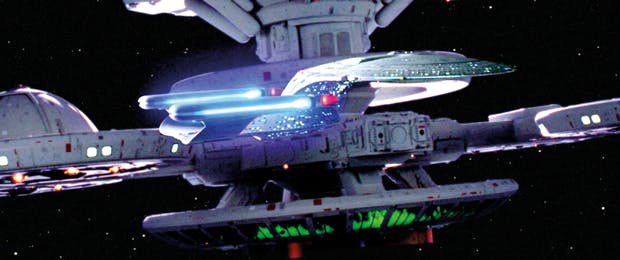
Star Trek is a worldwide phenomenon. StarTrek.com occasionally presents theme pieces and interviews featured in Inside Star Trek Magazine, the official Star Trek magazine of Italy. Today, we're pleased to share a recent Inside Star Trek Magazine feature -- written by XXXXX XXXXX -- about the TNG episode "The Measure of a Man." The story below had been translated from Italian into English by the magazine’s editor.
"The Measure of a Man" is generally considered one of the best episodes of The Next Generation, appearing frequently in first place in the rankings prepared by fans. Like the best stories of Star Trek, this episode addresses a matter of our society revisited in science fiction: the rights and freedoms of people.
Through a legal drama and analyzing Data’s nature and rights, the episode deals with the issue of human rights and freedom of human beings and sentient intelligence -- everywhere it can be found -- to control their own lives. In the process, they touched topics such as slavery, human rights, the right of choice, freedom and even the global responsibility of human societies. A few months ago, thanks to the high-def upgrading of The Next Generation for the Blu-ray releases, we can enjoy the episode in a new version, in particular adding several scenes that had been cut during editing.
In December of 1988, editor Robert Lederman worked on the episode “The Measure Of A Man,” written by the famous author of science fiction, as well as lawyer, Melinda Snodgrass. At the end of the first job of editing, the show was more than 13 minutes longer than necessary. Lederman went to work, along with the show’s producers and director Robert Scheerer, to reduce the episode to the maximum time allowed. Inevitably, some elements of the story, especially some related to the character’s development, were eliminated. Still, the finished work maintained the core themes examined by Snodgrass: whether or not Data possesses rights and self-determination like every other man. The key questions are actually posed by Captain Phillipa Louvois, played by Amanda McBroom: Is Data alive? Does he/it deserve the same rights as all of us? What does it mean to be human?
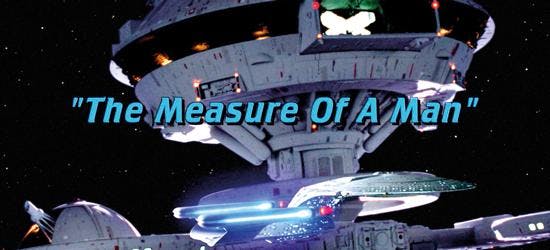
When CBS Home Entertainment decided to remastered TNG for the Blu-ray release, they chose to restore "The Measure of a Man" to its full running time. But, how? Usually, the film of any shots cut were simply trashed. Fortunately, when "Measure" was produced, a videotape of the full version had been given to Snodgrass, who kept it all these years. She lent it back to the Blu-ray team, allowing them to be able to present to the public a fully restored episode. For the occasion, the Blu-ray team also created the necessary visual effects and a new mix audio for the extended scenes. The beginning of the episode, enclosed in the teaser, is the same in both versions and, for the first time in the series, we see a poker game.
The scene -- interestingly -- was inserted in place of the original one Snodgrass wrote. In it, Data tried to learn how to swim, discovering that it is not as easy as it seems. The technical difficulties of realizing such a scene, and of course the costs, made it necessary to choose another introduction to the episode. And so the poker scene was introduced, and poker games would be seen over and over again in the course of the series, ultimately becoming the spectacular idea for closing out the series finale. Snodgrass was very positive about the change because the new scene reminded her an Original Series one in which the officers stay in a recreation room devoted to a variety of games meanwhile Uhura and Spock sing and play music. Even better, the poker game served a function linked to the development of the plot by providing Data, through the game and its specific dynamics, the tools to understand human nature. The scenes cut affected the characterization of minor characters or narrative elements that were redundant and, in face, addressed in other scenes.
One of the most sacrificed characters was Admiral Nakamura. The author had provided a brief exchange of words between Picard and him just as he boarded the ship. From those few sentences we learn that the two officers served together aboard the Reliant, obviously not the same as we know from the movie The Wrath of Khan, but a namesake. The admiral was a lieutenant, while Picard appears to have been on his first assignment -- as an ensign.
They hadn’t seen each other since then, and although both have had wonderful careers, Nakamura argues that the command of the Enterprise gives to Picard a role, and a position, that is the envy of many senior officers of Starfleet. It's a recurring theme in Trek, partly addressed in the 1979 film and taken up by Kirk in the movie Generations, when he advises Picard to never accept a promotion to rear admiral, but to sit in the chair of his ship, as captain, the only place where it is actually possible to make a difference.
In another scene, completely cut, that offers interesting insights, Data reaches the engine room, where Geordi is at work. It is an example of the round of greetings that surely any official transferring does when he abandons his post. Data offers Geordi, as a reminder of their experiences together, the pipe that he used in leisure hours on the holodeck when wearing the shoes of Sherlock Holmes and Watson. What is striking is the attitude of Geordi: extremely peaceful, compared to the radical change, surely for the audience. But it is a normal career development for any Starfleet officer. Having listened to the exchange of words between Nakamura and Picard we realize that, although Geordi claims that it will be possible for them to meet again, the truth is otherwise. In all probability, this greeting could be the last words they will have.
This same subject is treated in other TNG episodes, always with Data as the main character. Faced with the fear of death, Data expresses a concept which is not acceptable to the audience, but is part of existence: that change is a constant of human existence and those who are now dear friends, tomorrow could be added to other friendships, equally dear and precious.
The greetings tour continues a few scenes later. Data says goodbye to his traveling companions by opening gifts and talking with them. The final version offers just a few lines while in the longer edit there are passages connected to the previous scenes. At the end of the dialogue in the engine room, in fact, Data asks Geordi if he would imagine a life outside Starfleet, and both agree that they consider themselves only as career officers and can’t imagine a life elsewhere. In the “presents scene,” Dr. Pulaski, as if she had caught this difficulty, offers a suggestion to Data that incorporates the last words of Geordi in the engine room, that the universe is very large and the possibilities are enormous, so the android doesn’t have to worry about what awaits it, because they still will be important experiences.
During the farewell party, Riker and Deanna, too, have an exchange of words. Maddox’s proposal and the implications of its demands also force Data’s friends to reflect about it. The fear that he/it is actually just a bunch of circuits and software, a topic that will be reused later in the trial, is present in both, and the possibility that they are loyal to one thing, imbuing on it human feelings and personifying it as people do with a beloved object, is made clear -- especially by the words with which Deanna expresses everyone's disappointment. The arrival of Maddox at the party allows Data to express some of his ideas about job opportunities that this new situation will open and Riker expresses the anger of all the crew, all wrapped up in a few sentences and gestures.
As already said the cut of scenes reduced the characterization of Nakamura, but also one of the main characters was particularly resized: Riker. The commander has been ordered to take on the difficult task of prosecutor in the trial. In one scene, completely cut, Riker meets Picard, who is practicing fencing in one of the gyms, and states that he will assume his role and, within the limits imposed by law, try to win the confrontation. Snodgrass's idea for the scene would help give further depth to the legal battle between Riker and Picard, placing them opposite each other in a fight on the platform of a gym and anticipating, with Picard’s victory, the victory in the legal confrontation.
During the trial itself, there are very few changes, but one was very significant in the extended version: the way Picard approaches Data's briefcase. Maddox, during the episode, enters Data’s billet without knocking, flicks his objects and books without asking permission. That emphasizes how he looks at the android, Picard, during the trial, asks Data permission to open the case and to show the content to the judge. That's an attitude that not only highlights the different relationship between the two officers, but also the opinion that Picard has about the rights of artificial life forms.
Throughout the episode, but especially in the dialogue between Picard and Guinan and the hearing, it is clear to us a concept that it is very dear to Melinda Snodgrass: problems must be solved through words rather than through the use of force and firearms.
Beyond all of the above, in the episode there are several moments that reveal small, slight differences between the original final version and the extended one. Editing choices, close-ups added or removed, dialogue sequences not editor or differently edited. Alternative viewing angles, long shots, medium shots. These are not substantial plot differences, but they give to the more careful audience an opportunity to evaluate different choices made by the director and editors, and give the possibility to understand better how much work and preparation, photography, acting, directing and editing there is behind the creation of an episode.
Before concluding, a brief invitation: among the Blu-ray extras there is also the famous videotape given to Snodgrass. It is a hybrid work that combines cleaned and remastered version with the rough cut: no special effects or the seabed, without the interludes visual (shots of the ship, space, space station), without the sounds that usually accompany doors opening or the consoles. Captain’s log and the voice of the on-board computer were also missed and were read respectively by Monty DeGraff, an editor assistant, and Cosmo Genovese, a script supervisor. It is an interesting way to learn more about production of every single episode.
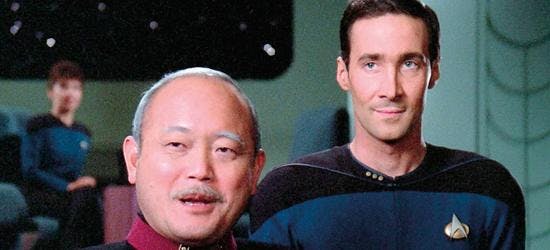
Admiral Nakamura and Bruce Maddox want to dismantle Data to study it.
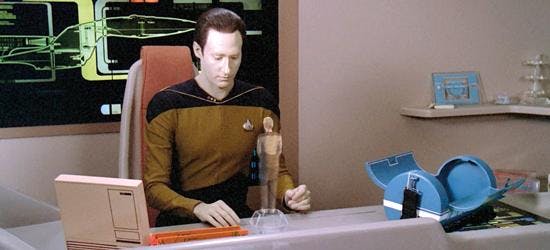
Data wants to resign from Starfleet in order not to be dismantled, but when he’s about to do so, he finds out that Starfleet considers him its property...
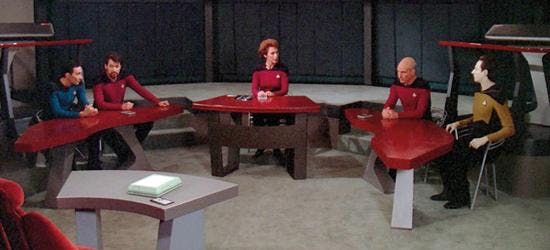
Captain Picard opposes this and wants a formal trial to establish if Data has the right to choose what's right for him.
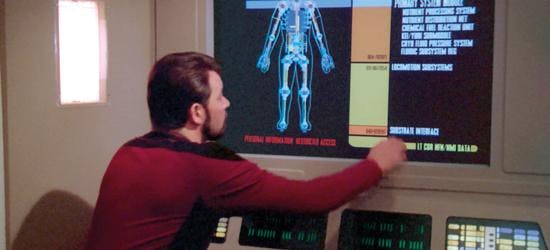
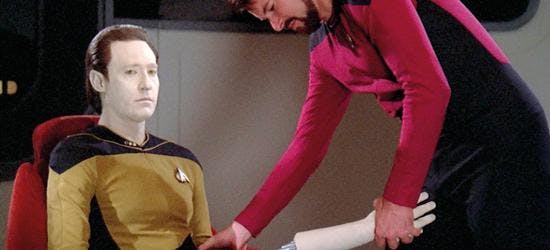
... but his demonstration is spotless, and there is no doubt anymore!
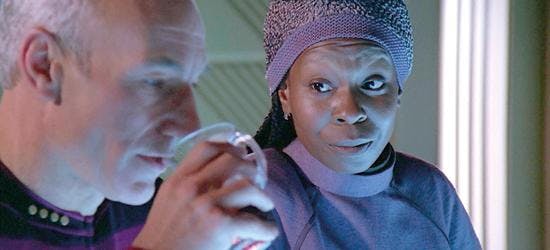
Data might be a machine, but is this enought to make him Starfleet’s property?
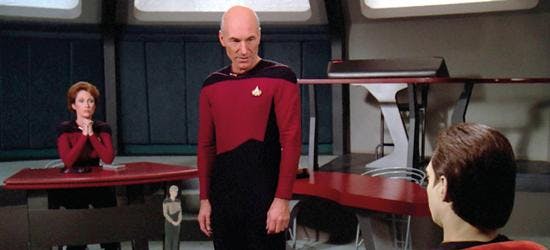
Human beings are also machines, built with different materials, but that does not make them property.
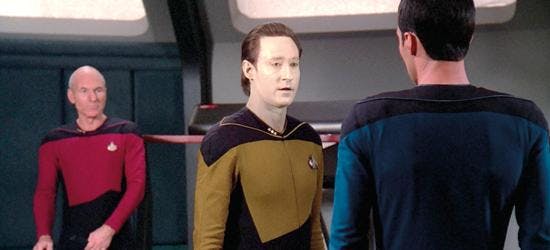
The trial has ended: Data has the freedom of choice... and his choice is not to be dismantled.
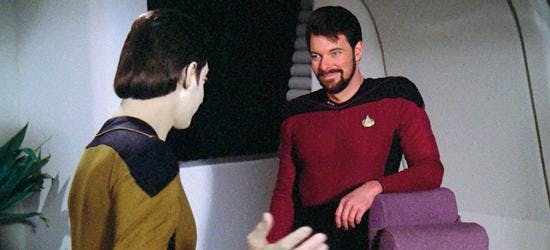
It’s time to celebrate, and the zealant prosecutor is invited, too: without him the trial would be closed, and who knows with which result?
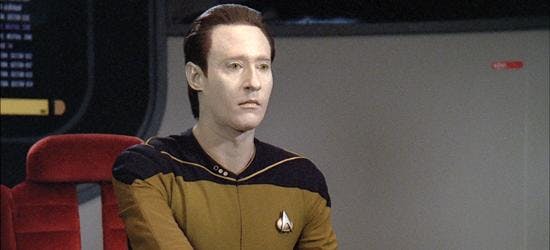
At the beginning of the episode, Data swears in before speaking to his trial and he does it as a Starfleet officer who has the rights of a... toaster. At the end, leaving the tribunal, he is a Starfleet officer with the same rights of his fellow “organic” shipmates.
